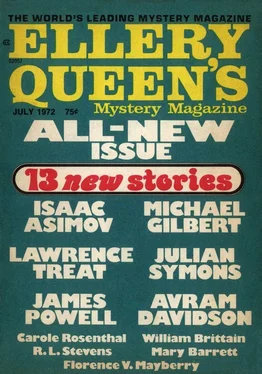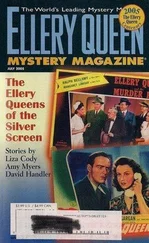Ellery Queen’s Mystery Magazine, Vol. 60, No. 1. Whole No. 344, July 1972
Здесь есть возможность читать онлайн «Ellery Queen’s Mystery Magazine, Vol. 60, No. 1. Whole No. 344, July 1972» весь текст электронной книги совершенно бесплатно (целиком полную версию без сокращений). В некоторых случаях можно слушать аудио, скачать через торрент в формате fb2 и присутствует краткое содержание. Город: New York, Год выпуска: 1972, Издательство: Davis Publications, Жанр: Классический детектив, на английском языке. Описание произведения, (предисловие) а так же отзывы посетителей доступны на портале библиотеки ЛибКат.
- Название:Ellery Queen’s Mystery Magazine, Vol. 60, No. 1. Whole No. 344, July 1972
- Автор:
- Издательство:Davis Publications
- Жанр:
- Год:1972
- Город:New York
- ISBN:нет данных
- Рейтинг книги:4 / 5. Голосов: 1
-
Избранное:Добавить в избранное
- Отзывы:
-
Ваша оценка:
- 80
- 1
- 2
- 3
- 4
- 5
Ellery Queen’s Mystery Magazine, Vol. 60, No. 1. Whole No. 344, July 1972: краткое содержание, описание и аннотация
Предлагаем к чтению аннотацию, описание, краткое содержание или предисловие (зависит от того, что написал сам автор книги «Ellery Queen’s Mystery Magazine, Vol. 60, No. 1. Whole No. 344, July 1972»). Если вы не нашли необходимую информацию о книге — напишите в комментариях, мы постараемся отыскать её.
Ellery Queen’s Mystery Magazine, Vol. 60, No. 1. Whole No. 344, July 1972 — читать онлайн бесплатно полную книгу (весь текст) целиком
Ниже представлен текст книги, разбитый по страницам. Система сохранения места последней прочитанной страницы, позволяет с удобством читать онлайн бесплатно книгу «Ellery Queen’s Mystery Magazine, Vol. 60, No. 1. Whole No. 344, July 1972», без необходимости каждый раз заново искать на чём Вы остановились. Поставьте закладку, и сможете в любой момент перейти на страницу, на которой закончили чтение.
Интервал:
Закладка:
“Oh, of course. All the same, I do wonder how he knew about Enoch cutting down the fence. He wasn’t with us.”
“With you ,” said Mr. Calder. “Do I gather, Stokes, that you took part in this — this enterprise?”
“Well, naturally, sir. Seeing I’m a member of the Parochial Church Council. Would there be anything more?”
“Nothing more,” said Mr. Calder. “Good night.”
He lay awake for a long time, listening to the owls talking to each other in the elms.
“It’s true,” said Colonel Faulkner next morning. “We are a bit inbred. All Norfolk men are odd. It makes us just a bit odder, that’s all.”
“Tell me about your rector.”
“He was some sort of missionary, I believe. In darkest Africa. Got malaria very badly and was invalided out.”
“From darkest Africa to darkest Norfolk. What do you make of him?”
The Colonel was lighting his after-breakfast pipe and took time to think about that. He Said, “I just don’t know, Calder. Might be a saint. Might be a scoundrel. He’s got a ‘touch’ with animals. No denying that.”
“What about the miracles?”
“No doubt they’ve been exaggerated in the telling. But — well, that business of the bells. I can give you chapter and verse for that. There is only one key to the bell chamber. I remember what a fuss there was when the key was mislaid last year. And no one could have got it from Penny’s cottage, opened the tower up, rung the bells and put the key back without someone seeing him. Stark impossibility.”
“How many bells rang?”
“The tenor and the treble. That’s the way we always ring them for an alarm. One of the farmers across the valley heard them, spotted the fire, and phoned for the brigade.”
“Two bells,” said Mr. Calder thoughtfully. “So one man could have rung them.”
“If he could have got in.”
“Quite so.” Mr. Calder was looking at a list. “There are three people I should like to meet. First, a man called Smedley.”
“The rector’s warden. I’m people’s warden. He’s my opposite number. Don’t like him much.”
“Then Miss Martin, your organist. I believe she has a cottage near the church. And Mr. Smallpiece, your village postmaster.”
“Why those three?”
“Because,” said Mr. Calder, “apart from the rector himself they are the only people who have come to live in this village during the past two years — so Stokes tells me.”
“He ought to know,” said the Colonel. “He’s related to half the village.”
Mr. Smedley lived in a small dark cottage. It was tucked away behind the Viscount Townshend pub, which had a signboard outside it with a picture of the Second Viscount looking remarkably like the turnip which had become associated with his name.
Mr. Smedley was old and thin and inclined to be cautious. He thawed very slightly when he discovered that his visitor was the son of Canon Calder of Salisbury.
“A world authority on monumental brasses,” he said. “You must be proud of him.”
“I’d no idea.”
“Yes, indeed. I have a copy somewhere of a paper he wrote on the brasses at Verden, in Hanover. A most scholarly work. We have some fine brasses in the church here, too. Not as old or as notable as Stoke d’Abernon, but very fine.”
“It’s an interesting village altogether. You’ve been getting into the papers.”
“I’d no idea that our brasses were that famous.”
“Not your brasses. Your rector. He’s been written up as a miracle worker.”
“I’m not surprised.”
“Oh, why?”
Mr. Smedley blinked maliciously and said, “I’m not surprised at the ability of the press to cheapen anything it touches.”
“But are they miracles?”
“You’ll have to define your terms. If you accept the Shavian definition of a miracle as an act which creates faith, then certainly, yes. They are miracles.”
It occurred to Mr. Calder that Mr. Smedley was enjoying this conversation more than he was. He said, “You know quite well what I mean. Is there a rational explanation for them?”
“Again, it depends what you mean by rational.”
“I mean,” said Mr. Calder bluntly, “are they miracles or just conjuring tricks?”
Mr. Smedley considered the matter, his head on one side. Then he said, “Isn’t that a question which you should put to the rector? After all, if they are conjuring tricks, he must be the conjurer.”
“I was planning to do just that,” said Mr. Calder, and prepared to take his leave. When he was at the door his host checked him by laying a clawlike hand on his arm. He said, “Might I offer a word of advice? This is not an ordinary village. I suppose the word which would come most readily to mind is — primitive. I don’t mean anything sinister. But being so isolated it has grown up rather more slowly than the outside world. And another thing—” Mr. Smedley paused. Mr. Calder was reminded of an old black crow, cautiously approaching a tempting morsel and wondering if he dared to seize it. “I ought to warn you that the people here are very fond of their rector. If what they regarded as divine manifestations were described by you as conjuring tricks — well, you see what I mean.”
“I see what you mean,” said Mr. Calder. He went out into the village street, took a couple of deep breaths, and made his way to the postoffice. This was dark, dusty, and empty. He could hear the postmaster, in the back room, wrestling with a manual telephone exchange. He realized, as he listened, that Mr. Smallpiece was no Norfolkman. His voice suggested that he had been brought up within sound of Bow Bells. When he emerged, Mr. Calder confirmed the diagnosis. If Mr. Smedley was a country crow, Mr. Smallpiece was a cockney sparrow.
He said, “Nice to see a new face around. You’ll be staying with the Colonel. I ’ope his aunt gets over it.”
“Gets over what?”
“Called away ten minutes ago. The old lady ’adder fit. Not the first one neither. If you ask me she ’as one whenever she feels lonely.”
“Old people are like that,” agreed Mr. Calder. “Your job must keep you very busy.”
“Oh, I am the cook and the captain bold and the mate of the Nancy brig,” agreed Mr. Smallpiece. “I work the telephone exchange — eighteen lines — deliver the mail, sell stamps, send telegrams, and run errands. ’Owever, there’s no overtime in this job, and what you don’t get paid for you don’t get thanked for.”
He looked at the clock above the counter which showed five minutes to twelve, pushed the hand forward five minutes, turned a card in the door from Open to Closed, and said, “Since the Colonel won’t be back much before two, what price a pint at the Viscount?”
“You take the words out of my mouth,” said Mr. Calder. As they walked down the street he said, “What happens if anyone wants to ring up someone while you’re out?”
“Well, they can’t, can they?” said Mr. Smallpiece.
When the Colonel returned — his aunt, Mr. Calder was glad to learn, was much better — Mr. Calder reported the negative results of his inquiries to date.
“If you want to see Miss Martin,” said the Colonel, “you can probably kill two birds with one stone. She goes along to the rectory most Wednesdays, to practise the harmonium. You’ll find it at the far end of the street. The original rectory was alongside the church, but it was burned down about a hundred years ago. I’m afraid it isn’t an architectural gem. Built in the worst style of Victorian ecclesiastical red brick.”
Mr. Calder, as he lifted the heavy wrought-iron knocker, was inclined to agree. The house was not beautiful. But it had a certain old-fashioned dignity and solidity. The rector answered the door himself. Mr. Calder had hardly known what to expect. A warrior ecclesiastic in the Norman mold? A fanatical priest, prepared to face stake and fire for his faith? A subtle Jesuit living by the Rule of Ignatius Loyola in solitude and prayer?
Читать дальшеИнтервал:
Закладка:
Похожие книги на «Ellery Queen’s Mystery Magazine, Vol. 60, No. 1. Whole No. 344, July 1972»
Представляем Вашему вниманию похожие книги на «Ellery Queen’s Mystery Magazine, Vol. 60, No. 1. Whole No. 344, July 1972» списком для выбора. Мы отобрали схожую по названию и смыслу литературу в надежде предоставить читателям больше вариантов отыскать новые, интересные, ещё непрочитанные произведения.
Обсуждение, отзывы о книге «Ellery Queen’s Mystery Magazine, Vol. 60, No. 1. Whole No. 344, July 1972» и просто собственные мнения читателей. Оставьте ваши комментарии, напишите, что Вы думаете о произведении, его смысле или главных героях. Укажите что конкретно понравилось, а что нет, и почему Вы так считаете.












